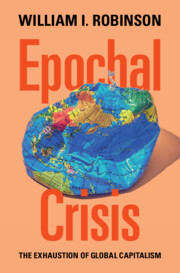Refine search
Actions for selected content:
9 results

Epochal Crisis
- The Exhaustion of Global Capitalism
-
- Published online:
- 21 August 2025
- Print publication:
- 04 September 2025
Chapter 27 - India Stack
- from Part IV - Digital Technologies and the Future of Financial Infrastructure
-
-
- Book:
- The Cambridge Global Handbook of Financial Infrastructure
- Published online:
- 21 May 2025
- Print publication:
- 05 June 2025, pp 336-346
-
- Chapter
-
- You have access
- Open access
- HTML
- Export citation
Conclusion
- from Part II - The Emergence of Modern Politics
-
- Book:
- Public Interest and State Legitimation
- Published online:
- 17 November 2023
- Print publication:
- 19 October 2023, pp 243-256
-
- Chapter
- Export citation
Introduction
-
- Book:
- Public Interest and State Legitimation
- Published online:
- 17 November 2023
- Print publication:
- 19 October 2023, pp 1-34
-
- Chapter
- Export citation
1 - Legitimacy and Resilience of the Early Modern State
- from Part I - Sources of Early Modern State Resilience
-
- Book:
- Public Interest and State Legitimation
- Published online:
- 17 November 2023
- Print publication:
- 19 October 2023, pp 37-68
-
- Chapter
- Export citation
7 - Salvaging State Legitimacy in Iraq through Decentralization
- from Part II - Decentralization and Governance Reform
-
-
- Book:
- Federalism and Decentralization in the Contemporary Middle East and North Africa
- Published online:
- 15 January 2023
- Print publication:
- 05 January 2023, pp 120-139
-
- Chapter
- Export citation
6 - Authority: Rwanda’s Privatized and Powerful State
-
- Book:
- The Path to Genocide in Rwanda
- Published online:
- 26 October 2020
- Print publication:
- 11 March 2021, pp 248-280
-
- Chapter
- Export citation
5 - Kurds and the International Society after the Cold War
-
- Book:
- Mapping Kurdistan
- Published online:
- 12 June 2020
- Print publication:
- 25 June 2020, pp 130-158
-
- Chapter
- Export citation
4 - The moral basis of armed humanitarianintervention revisited
-
-
- Book:
- The Ethics of Armed Humanitarian Intervention
- Published online:
- 05 June 2014
- Print publication:
- 24 April 2014, pp 61-77
-
- Chapter
- Export citation
